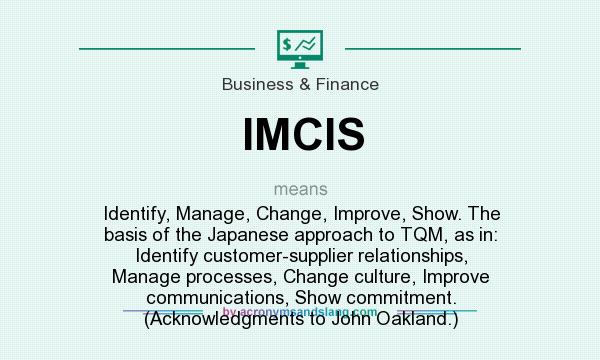What does IMCIS mean?
IMCIS means Identify, Manage, Change, Improve, Show. The basis of the Japanese approach to TQM, as in: Identify customer-supplier relationships, Manage processes, Change culture, Improve communications, Show commitment. (Acknowledgments to John Oakland.)
This acronym/slang usually belongs to Business & Finance category.
What is the abbreviation for Identify, Manage, Change, Improve, Show. The basis of the Japanese approach to TQM, as in: Identify customer-supplier relationships, Manage processes, Change culture, Improve communications, Show commitment. (Acknowledgments to John Oakland.)?
Identify, Manage, Change, Improve, Show. The basis of the Japanese approach to TQM, as in: Identify customer-supplier relationships, Manage processes, Change culture, Improve communications, Show commitment. (Acknowledgments to John Oakland.) can be abbreviated as IMCIS

|
|
Most popular questions people look for before coming to this page
| Q: A: |
What does IMCIS stand for? IMCIS stands for "Identify, Manage, Change, Improve, Show. The basis of the Japanese approach to TQM, as in: Identify customer-supplier relationships, Manage processes, Change culture, Improve communications, Show commitment. (Acknowledgments to John Oakland.)". |
| Q: A: |
How to abbreviate "Identify, Manage, Change, Improve, Show. The basis of the Japanese approach to TQM, as in: Identify customer-supplier relationships, Manage processes, Change culture, Improve communications, Show commitment. (Acknowledgments to John Oakland.)"? "Identify, Manage, Change, Improve, Show. The basis of the Japanese approach to TQM, as in: Identify customer-supplier relationships, Manage processes, Change culture, Improve communications, Show commitment. (Acknowledgments to John Oakland.)" can be abbreviated as IMCIS. |
| Q: A: |
What is the meaning of IMCIS abbreviation? The meaning of IMCIS abbreviation is "Identify, Manage, Change, Improve, Show. The basis of the Japanese approach to TQM, as in: Identify customer-supplier relationships, Manage processes, Change culture, Improve communications, Show commitment. (Acknowledgments to John Oakland.)". |
| Q: A: |
What is IMCIS abbreviation? One of the definitions of IMCIS is "Identify, Manage, Change, Improve, Show. The basis of the Japanese approach to TQM, as in: Identify customer-supplier relationships, Manage processes, Change culture, Improve communications, Show commitment. (Acknowledgments to John Oakland.)". |
| Q: A: |
What does IMCIS mean? IMCIS as abbreviation means "Identify, Manage, Change, Improve, Show. The basis of the Japanese approach to TQM, as in: Identify customer-supplier relationships, Manage processes, Change culture, Improve communications, Show commitment. (Acknowledgments to John Oakland.)". |
| Q: A: |
What is shorthand of Identify, Manage, Change, Improve, Show. The basis of the Japanese approach to TQM, as in: Identify customer-supplier relationships, Manage processes, Change culture, Improve communications, Show commitment. (Acknowledgments to John Oakland.)? The most common shorthand of "Identify, Manage, Change, Improve, Show. The basis of the Japanese approach to TQM, as in: Identify customer-supplier relationships, Manage processes, Change culture, Improve communications, Show commitment. (Acknowledgments to John Oakland.)" is IMCIS. |
Abbreviations or Slang with similar meaning
- COESAT - Corps of Engineers Systems Approach to Training
- GNATA - Guidance on the New Approach to Appraisal
- ISHAC - International Symposium on the Hybrid Approach to Congenital Heart Disease
- ARM - As an Approach to Managing
- CIMAS - Carolina Institute for the Multicultural Approach to Science
- CONSCISE - The CONtribution of Social Capital In the Social Economy to local economic development in Western
- LOVECORK - The application of fluidised bed technology to improve the combustion of Corkwaste
- MAST - manage the Military Assistance to Traffic
- TESTED-TQM - The Transfer and dissemination of the use of self-Evaluation Skills by Teachers/trainers as a central Element of the Development of a Total Quality Management approach to the provision of vocational e
- TJGTH - The Japanese Guide To Hawaii
- agritainment. - The introduction of attractions such as crop mazes, pony rides, farm tous, and the like, designed to attract tourists and thus supplement a farm's income.
- attitude. - The position of an aircraft relative to the direction in which it is traveling or to a known point of reference such as the ground or the horizon.
- capacity dumping. - The airline strategy of adding additional flights to a route in an attempt to drive a competitor out of business or off the route.
- Conditions of Carriage. - The fine print attached to an airline ticket; in effect, a contract that is heavily weighted in favor of the airline and to which the passenger ostensibly "agrees" as a condition of purchasing the tic
- fleet management. - The job of purchasing, maintaining, inventorying, and selling vehicles, as in the car rental industry.
- qualifying. - In sales, the process of determining if a prospect will make a good customer. Determining which travel product is right for a customer by asking questions.
- sustainable tourism. - The development of a region’s tourism industry in such a way as to not damage or deplete the resources and attractions that make the region attractive to tourists.
- total overall dimensions. - The combined length, width, and depth of a piece of luggage, typically used to determine whether a piece of luggage qualifies either as carry-on or regular baggage.
- Death Blossom - The tendency of Iraqi security forces, in response to receiving a little fire from the enemy, to either run away or do the ‚”death blossom” spraying fire indiscriminately in all directions.
- PRINCE/PRINCE2 - PRojects In Controlled Environments. As the UK Office of Government Commerce explains, the PRINCE methodology "...was first developed by the UK government in 1989 as the standard approach to IT project management for central government. Since then, the me